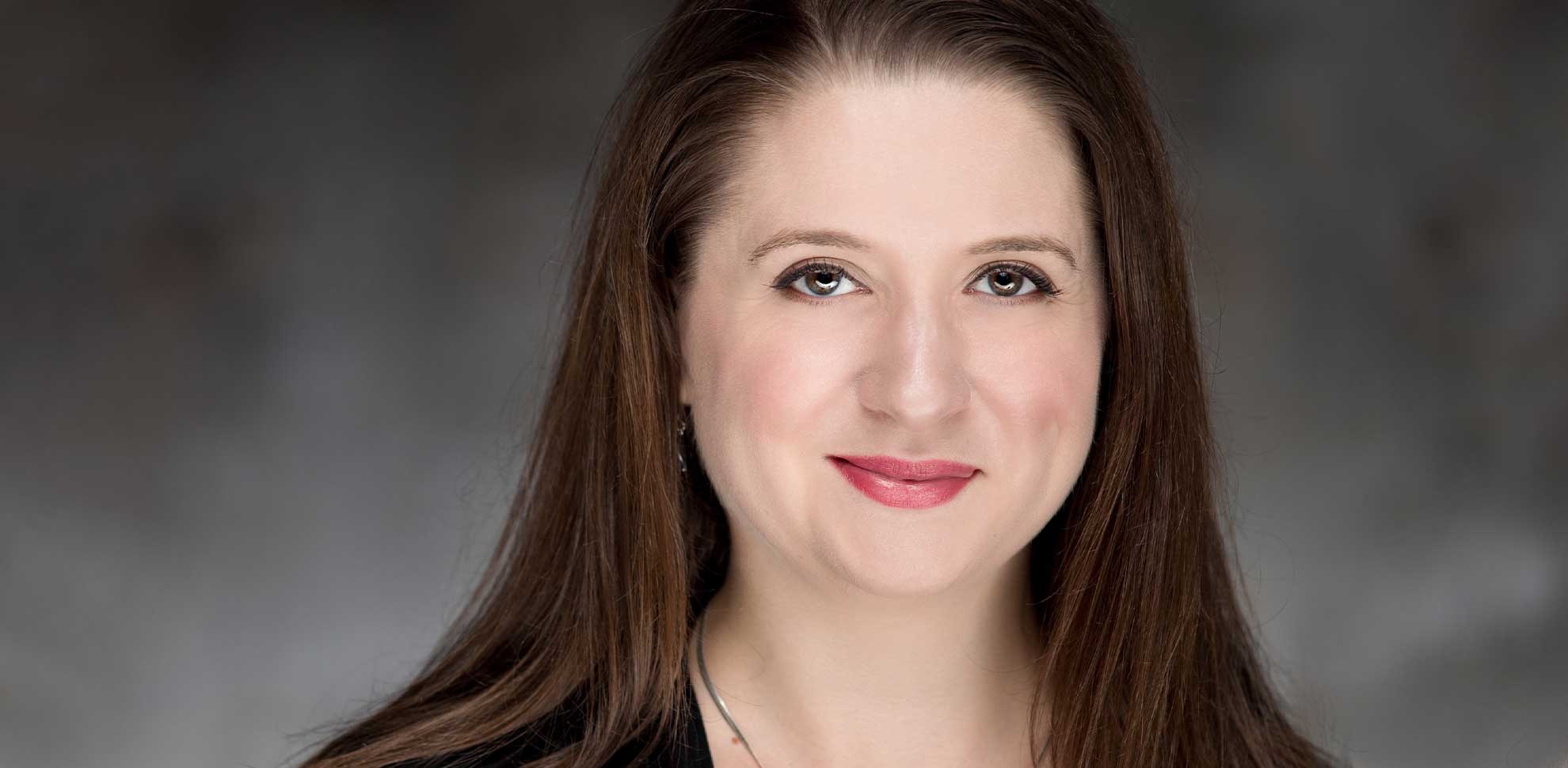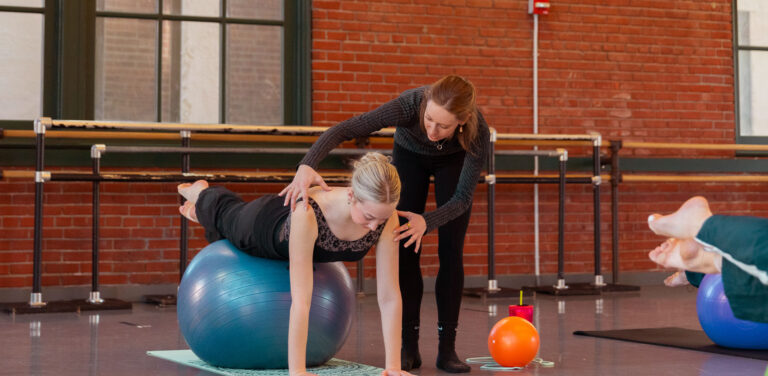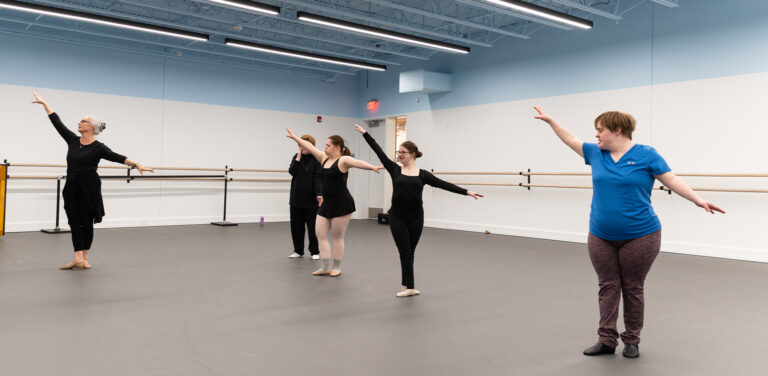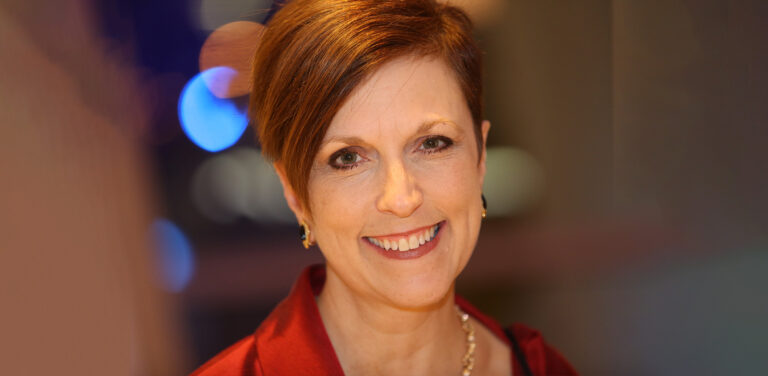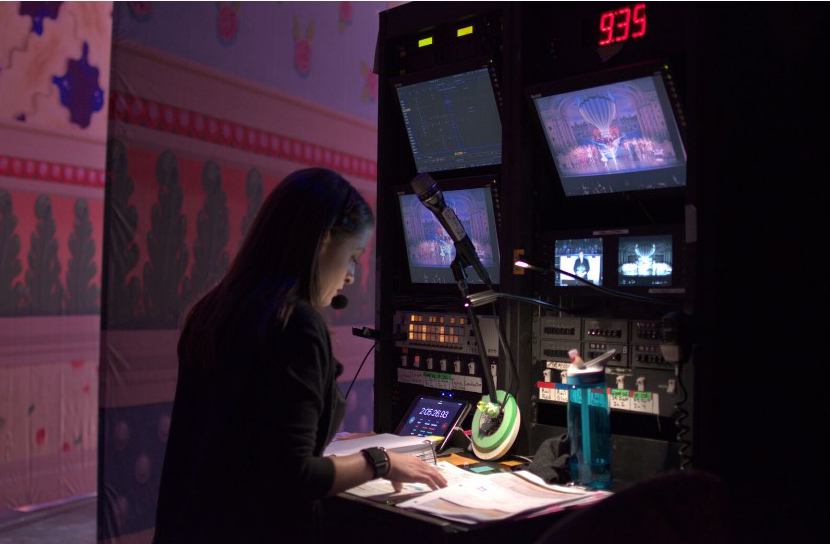
In just two short weeks, Kansas City Ballet will bring The Nutcracker back to the Kauffman Center stage. Thousands will enjoy watching the production, but there’s one woman calling the shots backstage at every performance. Meet Kansas City Ballet Stage Manager Victoria Frank.
TELL US ABOUT YOURSELF AND YOUR QUALIFICATIONS FOR THIS POSITION.
My introduction to theatre was through my father’s theatre company in Edinburgh, Scotland — the Realistic Theatre Company of Edinburgh. Most people don’t realize I am from England and lived in my hometown of York until I was 16 years old. (I’ve completely lost my accent!) I spent three summers performing in the children’s chorus of various musicals produced by my Dad’s company from age 11 to 15 and learned that I loved theatre but what I really wanted was to be backstage running things. My dad was the stage manager, production manager and company manager, so you could say I followed in his footsteps all the way to Kansas City! When I moved to KC, I had two years of high school left to complete and felt immediately at home in the theatre department at North Kansas City High School. The theatre teacher, Mr. Jackson, encouraged me to follow my heart and let me stage manage and assistant stage manage our high school shows from almost my first day at the school. I gained my first professional experience as a Production Assistant (PA) on A Christmas Carol at the Kansas City Repertory Theatre at age 18 when Jim Mitchell was the stage manager there. I learned so much about stage management from him and still consider him a mentor and friend to this day. It was through working at The Rep that I heard about the BA and MFA programs at UMKC and set my sights on earning those degrees to put me on the right path for my career. My stage management work in opera, theatre, and ballet has taken me across the country and occasionally back to the UK!
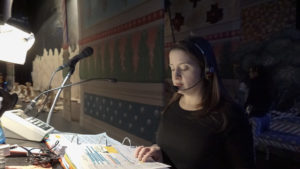
WHEN DID YOU START YOUR JOB AS STAGE MANAGER AT KCB?
The first time I worked for KCB was in 2008 as a Child Wrangler for The Nutcracker — a seasonal, part time position from October to December that still exists today! I child-wrangled The Nutcracker for four seasons and occasionally served as Assistant Stage Manager (ASM) for other productions throughout those years. I took a couple of years off from ballet to be a freelance opera stage manager (In the summer time, I still try to work in opera) but I applied for and was offered the role of full season Stage Manager when the position opened up in 2013. I started in August of that year.
DESCRIBE WHAT YOU DO TO SOMEONE UNFAMILIAR WITH YOUR ROLE.
Ballet stage managing is a different type of stage management from any other performing arts genre and many people have never heard of a stage manager at all! The easiest part of my job to describe is what I do during performances — I am backstage for every performance at my console and I “call” the show. The console is wired with various switches that connect to lights backstage that I turn on and off to cue the crew when to perform their various moves (rope lights along the wall are used to cue the fly men when to bring drops in or out, light bulbs hanging backstage on each side are used to cue carpenters or props department for scene changes). I also have a headset to communicate verbally with the light and sound board operators, my ASMs, the spotlight operators, deck electricians and some of the backstage crew. Nothing happens onstage unless I say “go”, from the moment the house lights dim at the beginning to when they come back up after bows. I start making pages over a backstage and dressing room intercom system and calling cues an hour before a performance starts!
WHAT DO YOU DO DURING REHEARSALS AT THE THEATRE?
During our theatre technical rehearsals, I am calling all of the same cues but also helping to keep track of when we need to take breaks, when we need to push forward or have time to really figure out a tricky onstage moment with the dancers and crew. If there are students in the production I may be helping the ASMs and Wranglers figure out when to switch to a different cast or return the students who just rehearsed to the stage so they can work on notes with the choreographer. The ASMs and I also create paperwork for the crew to follow during the rehearsals and run of the show that lists where and when each move happens — that paperwork often has to be updated and reprinted as we learn more about the show in tech so that everyone is on the same page for the next rehearsal.

WHAT DO YOU DO WHEN THE COMPANY ISN’T IN THE THEATRE?
When not in the theatre, I spend about half of my time in my office and half of my time in the studio watching or helping with rehearsal. If it’s a big new show, like The Wizard of Oz, I spend most of my day in the studio learning the technical aspects of the show along with the dancers so we are all as prepared as possible when we get to the theatre. In the 15-minute break between the end of the dancer’s morning class and the beginning of rehearsal, I make sure the studios are set up with the things the dancers and staff need for the day — CDs, archival DVDs, props, rehearsal costumes… I spend a surprising amount of time tracking down chairs for people to sit in! Our Ballet Master (Kristi Capps) and I have lunch every day in her office while she works on finalizing the rehearsal schedule for the dancers and it’s my job to make sure it gets posted and distributed to all the right people at the end of lunch. At the end of the day, I clear the studios again in time for the school’s evening classes starting. The rest of the day is spent responding to emails, helping to schedule various events (interviews, meetings, costume fittings, student rehearsals), preparing and updating show paperwork and drinking a cup of tea. No two days are the same lately, but that’s one of the things I enjoy most about stage managing — there’s no time to get bored!
DESCRIBE A TYPICAL PERFORMANCE? HOW IS NUTCRACKER DIFFERENT?
The Nutcracker is different from a typical production because the run is so much longer. A typical show has between six and 10 performances over a two-week span, for The Nutcracker this year we have 27 performances and are in the theatre for four weeks. For the dancers, this means they have opportunities to dance a wider range of roles within a production — we have between five and seven different casting combinations, during the rest of the season our productions have two or three casts. This is also a production where there is an opportunity for the ASMs and I to learn each others tracks so we can rotate or sub in if someone is out for a show. We have a total of six people on the stage management team for The Nutcracker — myself (the SM), two Assistant Stage Managers, a Student Stage Manager and two Assistant Student Stage Managers, by far the biggest staff we have all year. I am the only full-season, salaried Stage Manager on staff. Our first ASM is with us for most of the season and two of the Student Stage Managers were also with us for The Wizard of Oz but because The Nutcracker is a big show with a lot of students, we bring in more staff to make sure the show runs smoothly.
WHAT’S BEEN THE BIGGEST CHALLENGE FOR YOU?
As a stage manager, it can be tricky to maintain a good work/life balance when you’re in the middle of preparing for a production or in the theatre. Luckily, I have a very understanding husband (we just got married in June!) who is a freelancer, so we try to take advantage of our time off together when we can.
 WHAT HAS SURPRISED YOU THE MOST ABOUT YOUR JOB?
WHAT HAS SURPRISED YOU THE MOST ABOUT YOUR JOB?
I was most surprised that as a ballet stage manager, you’re not expected to be in rehearsal all the time. Opera and theatre stage managers are in rehearsal and are running rehearsal from the very beginning and it’s a different set up with ballet — the Artistic Staff runs the rehearsal and the Ballet Master assigned to the piece is responsible for knowing the details of the staging. I go to rehearsal to set up the props and costumes, learn the show technically, to have my own blocking notes for reference and occasionally to take archival video or help with the students.
WHAT IS YOUR FAVORITE PART OF YOUR JOB?
I love calling shows. It’s hard to describe but I think it must be how a performer feels when they are onstage doing what they love. Calling the first cue to start a performance, especially on opening night, can be so thrilling. It’s like flipping the switch to start a roller coaster and there’s no getting off until it’s over!
Photography provided by John Burke, Steve Wilson, Kansas City Ballet and Victoria Frank.
